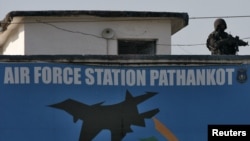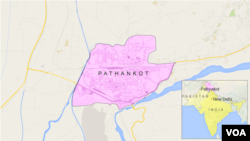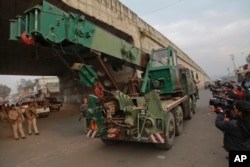India's defense minister said Tuesday a total of six militants have been killed after an attack on an airbase in northern India, and that the multi-day effort to secure the site was ongoing.
The gunmen who began their attack on the strategic base in Pathankot town near the Pakistani border on Saturday killed seven security personnel.Indian officials say they will continue sweeping the area for any potential remaining militants until they are sure it is secure.
Pakistani Prime Minister Nawaz Sharif's office said he spoke by phone Tuesday with Indian counterpart Narendra Modi and told him Pakistan is working on leads and information provided by India to help investigate the attack.
Sharif said whenever there is a serious effort toward peace, terrorists try to derail the process and that the two leaders agreed a cooperative relationship is the most appropriate response.
Militant alliance claims responsibility
An alliance of of more than a dozen militant groups called the United Jihad Council, based in Pakistani Kashmir, has claimed responsibility for the attack.The group, which is fighting to end Indian rule in Kashmir, said it wanted to show India that no military installation was out of the reach of militants and India should allow Kashmiris to decide their political future.
The claim of responsibility came in a statement issued to a Srinagar-based news agency.
Reports in India have suggested that the Pakistan based Jaish-e-Mohammad group carried out the attack.
Officials stressed that all the installations at the base, which houses fighter jets and assault helicopters, are safe. “I would like to assure everybody that all these air assets have been secured and are safe, there has been no damage to anyone of them,” Brigadier Anupinder Belvi told reporters.
Although officials are trying to stress that damage at the airbase was minimized, questions are being raised over how the gunmen managed to enter the military facility despite intelligence alerts about a possible terror attack.
“There are serious holes in the entire security structure”, says Sukh Deo Muni at New Delhi’s Institute of Defense Studies and Analyses. “How should this happen after all the alerts that were given?”
Even as operations were continuing, India witnessed a second militant attack when four unidentified gunmen tried to storm its consulate in the Afghan town of Mazar-e-Sharif.
Investigating attacks
Indian Prime Minister, Narendra Modi held a meeting Monday to review both the attacks, which took place about a week after he visited Lahore in an effort to boost a flagging peace process with the rival nation.
Questions are now being raised in New Delhi on how the government will react and whether the attacks will impact talks scheduled to be held between the foreign secretaries of the two countries in Islamabad later this month.
Pakistan on Monday again condemned the airbase attack in India and said it is "working on the leads provided by" New Delhi to help investigate the deadly assault in line with Islamabad's commitment to effectively counter and eradicate terrorism.
A foreign ministry statement said that "living in the same region and with a common history, the two countries should remain committed to a sustained dialogue process."It added that the challenge of terrorism calls for strengthening our resolve to cooperative approach.
Analyst S.D. Muni said there is pressure from both within the ruling party, opposition parties and civil society to cancel the bilateral dialogue, but New Delhi’s options are limited. “I don’t think government has many better options, because canceling the talks again puts the whole thing into square one. What do you? If you don’t talk, this is where you come to a dead end of diplomacy,” says Muni.
Ayaz Gul contributed to this report from Islamabad, Chris Hannas contributed from Washington.












